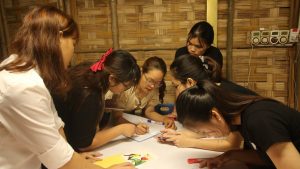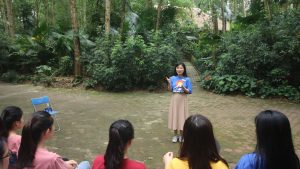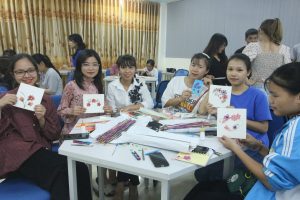
The Jeanne Sauve Foundation is so proud and grateful to support an incredible Sauve Fellow, Thinh Nguyen, with her project to empower disadvantaged women in Vietnam through social entrepreneurship and youth leadership initiatives.
Below is a report from Hanoi on this inspiring project. It details what this Sauve leader is achieving and how she is having direct impact in her community to improve the lives and futures of these young women.
A 2020 Report from Better Life Vietnam:
Hanoi, November 27, 2020
ACKNOWLEDGEMENT
The Project team would like to express our thanks and gratitude to the Jeanne Sauve Foundation for enabling us to implement this project in Thai Nguyen, Vietnam. The team also would like to express our special thanks to the Thai Nguyen University of Agriculture and Forestry (the TUAF) for supporting us to carry out activities of this project. We also express our thanks and gratitude to the trainers and ethnic students of the TUAF for their active participation in the different components of this project. The project has achieved its objectives with practical outcomes and outputs which helps increase the selected students’ knowledge on social entrepreneurship, start-ups, gender and enable them to have a part-time job through learning to make quilling handmade artworks.
Ethnic minorities in Vietnam, in particular women and girls, are the most disadvantaged groups in the country. They have less access to opportunities, resources and are less able to raise their voices. The lack of opportunities and powerful social norms often belittle them and confine them to reproductive activities and household chores due to stereotypes and other cultural barriers. In 2014, the rate of ethnic minority trained women workers was 7.2% compared to 17.6% for Kinh-Hoa trained women workers because of economic reasons. Minority women are less involved in business activities compared to their Kinh counterparts. Limited travel to markets discourages minority women to learn new techniques to improve productivity.
In order to address this problem, this project aims to provide the students with a support system. We want them to gain better opportunities through better employment opportunities and to know more about their rights and gain a better sense of empowerment in their lives through leadership initiatives, social entrepreneurship and gender education. The implementers use two strategies: Firstly, we aim to provide free vocational training in making handmade artwork to help students earn an income to finance their university studies. Secondly, we aim to provide social entrepreneurship skills and gender related knowledge that will guide the students to apply this project to help their villagers to generate extra income through the handmade artwork business. The pilot group of students will be expected to act as the trainers who will train and organize other students and their villagers to join the project in the long term.
ISSUE ANALYSIS & JUSTIFICATION
We decided to implement the project in partnership with the Thai Nguyen University of Agriculture and Forestry (TUAF). TUAF is among the few universities in the country to have a high proportion (roughly 60%) of ethnic students coming from remote mountainous provinces. These ethnic students often have to cope with more difficulties than their counterparts during their time at university as a result of language barriers and poverty. Nearly 30% of ethnic minority students come from poor families (living under USD 1.2/person/day). We decided to select 30 students, the majority of of whom come from ethnic minority groups, to participate in our project. They received training on social entrepreneurship, gender education and vocational trainings that raised their awareness of gender issues and enhanced their ability to be social entrepreneurs. After the vocational training of teaching the students to make handmade quilling artwork products, they will get a part-time job and then earn extra money to finance their university studies.
We hope to encourage sustainability and transfer of knowledge. The selected students will be expected to be the trainers who will organize for other students and people in their villages. This way the project enters a long-term positive reinforcement cycle in the long-term and is not simply a one-time shot. They will be the change agents to disseminate the skills and knowledge they have learned from the projects to the people in the communities in which they hail, who are mostly living in poverty. One of the training sections was about leadership skills which will help the students to be better change agents in their communities.
PROJECT OUTPUT
- Promote awareness of students on gender equality and improve the economic rights of ethnic minority women;
- Improve the financial situation of selected ethnic students from poor families in rural areas;
- Transfer knowledge and skills on social entrepreneurship of selected ethnic students.
PROJECT ACTIVITIES AND RESULTS
Provision of Gender Training Workshops
Participants were provided with knowledge about sex, gender, gender stereotypes and gender-based discrimination. The CEDAW and rights-based approaches were also introduced to participants to understand gender substantive equality as compared to formal and protectionist approaches. Through group discussions and debates about the principles of substantive equality, all participants left equipped with improved knowledge about gender equality.
Participants also discussed intersectionality and the dual stereotypes faced by women from ethnic groups. They discussed the intersections of gender and ethnicity, and challenges faced by ethnic minority women in the start-up business and how to manage these situations.
Responses from the participants shows that their understanding of gender stereotypes against ethnic minority women during their startup business would help them confidently overcome the gender challenges they would face while starting their own businesses.
Provision of social entrepreneurship and soft skills training workshop
The students who are selected to participate in the project’s activities have little or no knowledge on social entrepreneurship before participating in the training. In the first session of the training, while being asked how much they knew about social entrepreneurship, 80% of them said they had never heard or read that term before; The other 20% of them said they had heard or read that term before, and one of them was able to define that term. They were then trained and given discussions and practice parts on different dimensions of that topic, including the importance of social enterprise to social development, the advantages of being a social entrepreneur, leadership in social entrepreneurship, social entrepreneurship in the Vietnamese context, and tools to develop social entrepreneurship, including Design Thinking and Business Model Canvas (BMC).
As a result, in the reflection session:
100% understand what social entrepreneurship is about;
100% understand the importance of social entrepreneurship in social development;
67% are confident of applying Design Thinking tool to develop business ideas;
53% are confident of making their own Business Model Canvas (BMC) to develop and give presentations of their business ideas;
100% know where to search for support once they have the startup ideas for social entrepreneurship.
In addition, the participants also attended training sessions on public speaking skills and video interviews. These training sessions helped participants be more confident and equipped them with techniques that they can practice more at home in order to be effective public speakers.
Provision of handmade quilling artwork training
The training workshop ended with a series of quilling artwork training sessions. At these sessions, participants were introduced to the quilling handmade artwork industry, doable quilling handmade artwork products, and job opportunities in this industry.
The participants then gained hand-on experience through practicing to make quilling handmade greeting cards. They learned how to use basic tools to make quilling artwork and practice to make simple samples of quilling cards. In the end of each week, participants were able to make their own quilling cards, following provided samples. Participants learned more complicated techniques after each week. They have now entered the self-practice period where they practice to make more complicated samples on their own to master their quilling skills. Those who are passionate about this quilling artwork and skillful enough, will be introduced to join the quilling handmade artwork production chain. This will help them to have a part-time job and earn some money to finance their studying at university.
MOVING TOWARDS THE FUTURE
The effects of this project will be lasting and durable. As the project leaders, we have discussed the long-term plan to support the selected students. Accordingly, the project team has started several new initiatives, which we are excited to announce here:
First, an online group has been created for the students to continue learning to make handmade quilling cards from the quilling trainer virtually. The quilling trainer will make tutorial videos to guide students to practice the tricky techniques. The students are assigned to submit the final quilling card products after two months of self-practicing.
Second, students are encouraged to go back their villages and organize this same type of vocational training to empower ethnic women in their own communities. We want the knowledge-transfer to continue this way.
Finally, we hope to continue offering similar workshops to other students in the future, in particular to disadvantaged Vietnamese students. The eagerness and enthusiasm for learning new knowledge and skills made us believe that more training courses on soft skills should be implemented. We are well aware that the selected students are among many other students who do not yet have those soft skills such as leadership skills, communication skills, time management, problem solving skills, etc. Those are important skills which will help students to be equipped for a more successful life. As the leaders of Better Life Vietnam, we continue to work towards this mission and we plan to continue to apply for small grants to be able to carry out such soft skills training workshops for the students in the near future.
Thank you again to the Jeanne Sauvé Foundation staff for their support and funding for the implementation of this project.



